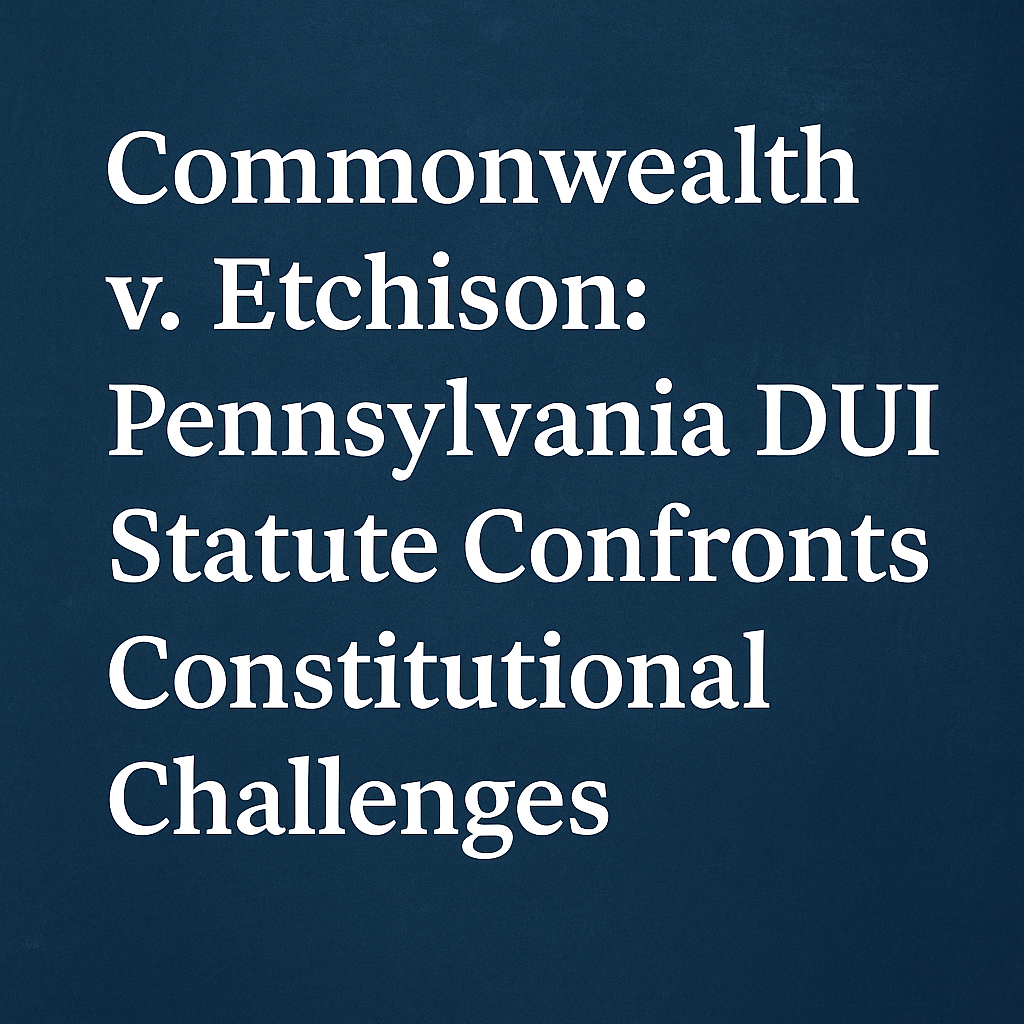Commonwealth v. Etchison: The Constitutional Limits of DUI Metabolite Convictions in Pennsylvania
June 22, 2025
 In Commonwealth v. Etchison, 916 A.2d 1169 (Pa. Super. Ct. 2007), the Pennsylvania Superior Court addressed critical constitutional and evidentiary issues regarding DUI convictions under § 3802(d) of the Pennsylvania Vehicle Code. The case examined whether the Commonwealth can sustain a DUI conviction based solely on the presence of marijuana metabolites in a driver’s blood—even without evidence of impairment.
In Commonwealth v. Etchison, 916 A.2d 1169 (Pa. Super. Ct. 2007), the Pennsylvania Superior Court addressed critical constitutional and evidentiary issues regarding DUI convictions under § 3802(d) of the Pennsylvania Vehicle Code. The case examined whether the Commonwealth can sustain a DUI conviction based solely on the presence of marijuana metabolites in a driver’s blood—even without evidence of impairment.
Case Background
Nathan Etchison was stopped by Pennsylvania State Police for driving the wrong way on an exit ramp. The officer noted signs of intoxication—odor of alcohol, glassy eyes, and slurred speech—and Etchison failed field sobriety tests. His BAC was .05%, and a drug screen revealed 53 nanograms of marijuana metabolites in his blood.
He was convicted under three subsections of § 3802(d):
§ 3802(d)(1): Driving with any amount of a controlled substance or metabolite in the blood.
§ 3802(d)(2): Driving under the influence of a drug that impairs ability.
§ 3802(d)(3): Driving under the combined influence of alcohol and a drug to a degree that impairs ability.
Superior Court Ruling
The Superior Court issued a split decision:
Convictions under § 3802(d)(2) and (d)(3) Reversed
The Court held there was insufficient evidence that Etchison was under the influence of drugs—or a combination of drugs and alcohol—to a degree that impaired his ability to drive. The Commonwealth’s own toxicology expert conceded that marijuana metabolites only indicate past use, not current impairment. This admission was fatal to sustaining a conviction under subsections (d)(2) and (d)(3), both of which require proof of impairment.Conviction under § 3802(d)(1) Affirmed
The Court upheld the conviction under § 3802(d)(1), which criminalizes driving with any amount of a Schedule I, II, or III substance or its metabolites in one’s blood. Even without impairment, Etchison violated this "zero-tolerance" provision.Constitutional Challenges Rejected (Majority Opinion)
Etchison argued that § 3802(d)(1) was unconstitutionally overbroad and violated equal protection because it criminalizes non-impairing, lawful conduct (e.g., passive marijuana inhalation or legal marijuana use abroad). The Court rejected these arguments, holding that:The statute does not infringe on any constitutionally protected conduct.
All drivers are treated equally under § 3802(d)(1), regardless of impairment.
The legislature can rationally target any presence of controlled substances to promote road safety.
Concurring and Dissenting Opinion
Judge Bender dissented in part, arguing that § 3802(d)(1) is unconstitutionally overbroad. He emphasized:
Metabolites can persist for weeks without causing impairment.
Individuals could test positive due to lawful, unintentional, or international use.
Criminalizing non-impairing presence of metabolites punishes status, not conduct, and fails to serve the statute’s purpose of removing unsafe drivers.
Impact and Legal Significance
Commonwealth v. Etchison underscores a critical distinction in Pennsylvania DUI law:
Impairment is required for convictions under subsections (d)(2) and (d)(3).
Impairment is not required for subsection (d)(1), which remains a controversial strict liability offense.
This case continues to shape the debate on whether DUI laws should require actual impairment and how far legislatures can go in regulating driver behavior based on blood chemistry alone.

